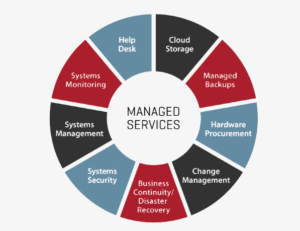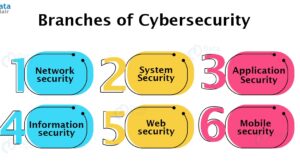Losing data can be a devastating experience for any business. In today’s growing world of technology, we are forced to depend on data, IT, and cyber solutions to run a modern and functional business. Therefore it’s so important to have managed IT services at the ready – you never know when you’re going to be facing a cybersecurity attack or loss of important data. Whether the cause of technical interruptions is a computer issue, human error, or a malicious attack, the potential disruption to operations and financial losses can be significant. Fortunately, there are ways to recover lost data and minimize the damage. Here, we will explore some strategies for effectively and efficiently recovering your data without too much downtime.

Data Backup Solutions
The most effective way to protect your data from loss is to have an adequate backup system in place. If disaster strikes—whether it’s a virus attack or natural disaster—you’ll have access to recent versions of your data stored on an external drive or cloud server. While having a backup won’t always prevent you from losing important files, it will make recovery much easier and faster. It’s important to note that backing up your data is only half of the equation; you also need to ensure that your backups are secure, reliable, and updated regularly using managed IT services, so that they remain current with all changes you have made since the last backup was completed. It’s also best practice to store copies of your backups offsite in case of physical disasters such as fire or flooding.
Data Recovery Services
If you haven’t been able to protect yourself from data loss through regular backups, then you may need to call in the professionals. Data recovery services specialize in retrieving lost information from damaged hardware or corrupted software systems by using advanced techniques such as disk imaging and file carving. These services can be expensive, but they may still be worth considering if you don’t have another option for recovering critical information. It’s also possible for individuals with technical expertise to attempt manual recovery methods such as attempting repairs on damaged hardware or restoring deleted files from existing backups; however, these solutions can be time-consuming and risky, so it’s usually best left up to the experts if possible.
Final Thoughts
Losing data can wreak havoc on any business – large or small – leading to costly disruptions and financial losses if not addressed quickly and appropriately. The best way to avoid this situation is by implementing robust backup solutions that are regularly updated and securely stored offsite; however, if unfortunate circumstances arise where this isn’t an option then professional data recovery services should be considered as soon as possible to minimize any further damage or disruption caused by the loss of critical information. Taking proactive steps now will save both time and money in the long run!
IT Services: What Are They & Why Use Them
IT services are support services provided by an information technology (IT) service provider. An IT service provider is a company that specializes in the planning, design, implementation, management, and maintenance of an organization’s IT infrastructure.
The main goal of IT services is to provide businesses with a competitive advantage by improving their efficiency and productivity, and can also help organizations reduce their costs, increase their revenues, and improve their customer satisfaction levels. In addition, IT services can help organizations improve their communication and collaboration capabilities, and increase their agility.

What Are the Benefits of Using IT Services?
There are many benefits of using IT services. Depending on the size of your business and the nature of your company, you will have different needs across the board. However, regardless of your company’s background, some of the most important benefits to hiring an IT technician include the following.
Improved Efficiency and Productivity
One of the main goals of managed IT services is to improve the efficiency and productivity of businesses. By outsourcing your IT needs to a service provider, you can free up your internal resources so they can focus on more important tasks. In addition, service providers have the expertise and resources required to efficiently manage your data infrastructure. As a result, you can expect to see an improvement in your organization’s overall efficiency and productivity levels.
Reduced Costs
Another major benefit of using IT services is that they can help you reduce your costs. When you outsource your IT needs to a service provider, you only must pay for the services you need. In addition, service providers usually have economies of scale that allow them to offer their services at a lower cost than what you would incur if you managed your own IT infrastructure. As a result, using professional IT services can help you save a significant amount of money over the long term.
Improved Customer Satisfaction Levels
A great reason to consider a professional IT service is that it can help you improve your customer satisfaction levels. Service providers can help you implement systems and processes that are designed to improve your customer service offerings. In addition, they can also help you troubleshoot any issues that your customers may be having with your systems and processes.
Conclusion
As you can see, there are many benefits of using IT services. If you are looking for ways to improve your organization’s efficiency and productivity levels, save money on your overall costs, or want to improve your customer satisfaction levels, then using IT services can also help you achieve that goal. Regardless of your motivation to hire an IT professional, you will be enhancing the security and efficiency of your company.
5 Tips For Protecting Your Data
In our digital age, data is more important than ever before. Businesses of all sizes rely on data to track their performance, understand their customers, and make decisions about their products and services. Personal data is also increasingly valuable, as we use it to access online banking, social media, and a host of other personal services.
With all this valuable data online, it’s no wonder that data breaches have become more common in recent years. In fact, data breaches don’t just end up doing damage to your inventory or business systems – it also has an effect on your company reputation and reflects on your services.
It’s no wonder companies are becoming increasingly aware of the importance of data and IT services. So how can you protect your data? Keep reading for five important tips.

1. Know where your data is stored
The first step in protecting your data is knowing where it is stored. You should have a clear understanding of where your sensitive data is located and who has access to it. This will help you determine what security measures need to be put in place to protect it.
2. Encrypt your data
Encryption is one of the most effective ways to protect your data. When data is encrypted, it becomes unreadable without the proper key or password. This makes it much more difficult for hackers to access your sensitive information.
If the thought of encrypting data yourself seems impossible, don’t worry. There are plenty of professional IT service providers willing to assist with this kind of issue.
3. Use strong passwords
Another important way to protect your data is by using strong passwords. Hackers are always trying to guess passwords, so it’s important to choose ones that are difficult to guess but easy for you to remember. A good password should be at least eight characters long and include a mix of letters, numbers, and symbols.
4. Back up your data regularly
Backing up your data regularly is one of the best ways to protect it from being lost or corrupted. There are many ways to back up your data, so find one that works best for you and make sure to do it on a regular basis.
For more direction on a safe, secure, and fool-proof backup method, speak to a professional IT technician, as they will have plenty of recommendations for best practices.
5. Keep your software up to date
One final way to protect your data is by keeping your software up to date. Software updates often include security patches that can help protect your system from being hacked. So make sure you’re always running the latest version of your operating system and other software programs.
If you aren’t sure how often to update your software, or what the best kind of software programs there are out there, a quick internet search or conversation with your local IT technician will clear that up.






